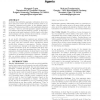Free Online Productivity Tools
i2Speak
i2Symbol
i2OCR
iTex2Img
iWeb2Print
iWeb2Shot
i2Type
iPdf2Split
iPdf2Merge
i2Bopomofo
i2Arabic
i2Style
i2Image
i2PDF
iLatex2Rtf
Sci2ools
PODS
2010
ACM
2010
ACM
Universally optimal privacy mechanisms for minimax agents
A scheme that publishes aggregate information about sensitive data must resolve the trade-off between utility to information consumers and privacy of the database participants. Differential privacy [5] is a well-established definition of privacy—this is a universal guarantee against all attackers, whatever their side-information or intent. In this paper, we present a universal treatment of utility based on the standard minimax rule from decision theory [13] (in contrast to the utility model in [8], which is Bayesian). In our model, information consumers are minimax (riskaverse) agents, each possessing some side-information about the query, and each endowed with a loss-function which models their tolerance to inaccuracies. Further, information consumers are rational in the sense that they actively combine information from the mechanism with their sideinformation in a way that minimizes their loss. Under this assumption of rational behavior, we show that for every fixed count quer...
| Added | 10 Jul 2010 |
| Updated | 10 Jul 2010 |
| Type | Conference |
| Year | 2010 |
| Where | PODS |
| Authors | Mangesh Gupte, Mukund Sundararajan |
Comments (0)

